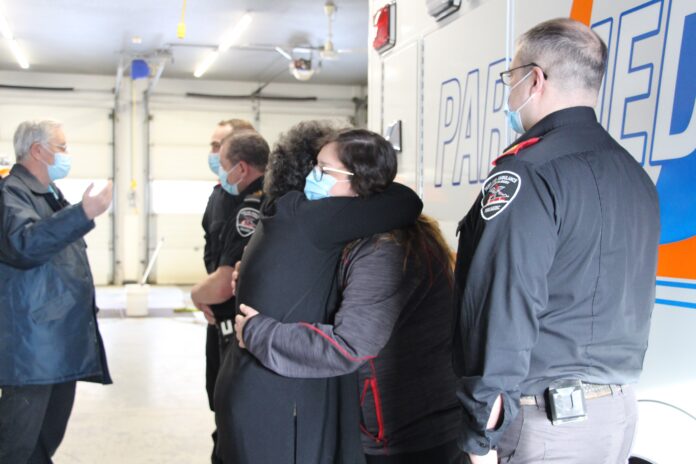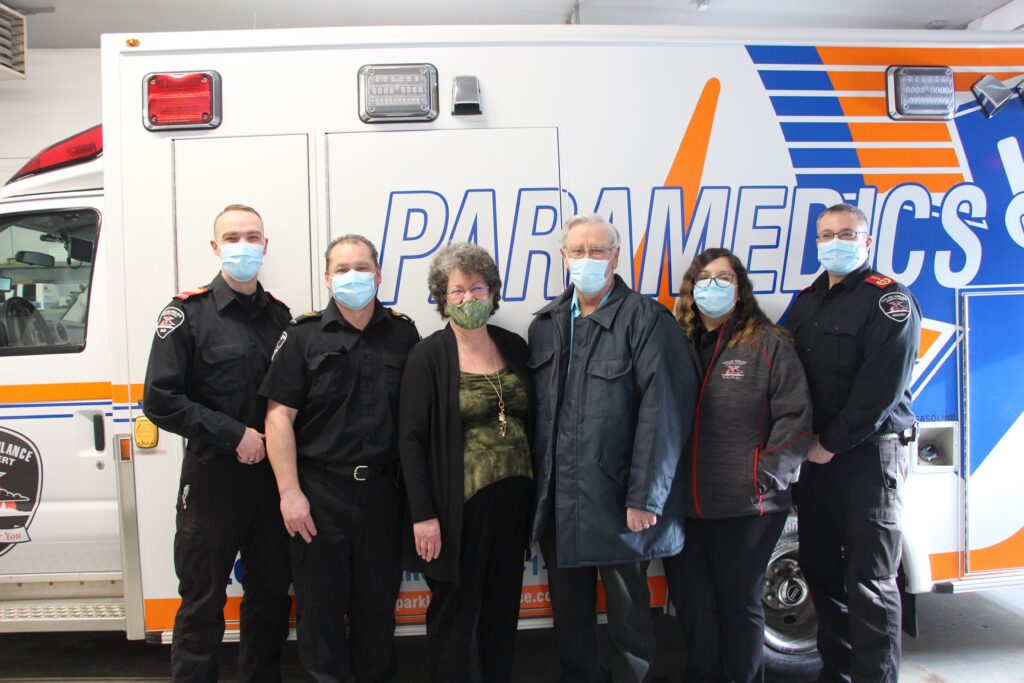
Cliff Quiring’s doctors call him a Christmas miracle.
Quiring suffered a cardiac arrest on Dec. 21 at his home in Prince Albert. He was later transported to Saskatoon’s Royal University Hospital where he spent three days in a coma. His doctors told him that very few people survive the same cardiac arrest he had, and people that do survive don’t usually come back as well or suffer brain injuries as a result.
But a month later, the 61-year-old says his recovery is going well.
On Friday, he and his wife Colleen met the paramedics and dispatcher that helped save his life.
He has to rest and hasn’t returned to work yet. He also isn’t allowed to shovel snow but he jokes that’s his sons job.
Just before Christmas, Cliff wasn’t feeling well and had a sore arm. He walked into his bedroom where Colleen followed and gave him Aspirin to chew.
“I had no idea what was going on,” Cliff said.
Colleen said she talked with Cliff a bit and asked if he wanted to go to the hospital. He told her that he was getting better.
“The next thing I knew his eyes rolled back in his head and he fell back on the bed. That’s when I called 911,” Colleen said.
Colleen said it was a scary moment but paramedics arrived quickly.
“It was four minutes from the time we called to the time they showed up at the door. Four minutes, that’s incredible,” Cliff said.
While Colleen was on the phone with 911 before paramedics arrived, emergency medical dispatcher Sherrilynn Halkett walked her through CPR.
Colleen has taken CPR courses in the past for work and said that also helped her in this situation.
Halkett said Colleen was a good caller and started taking CPR steps quickly. She added that the program dispatchers use to walk callers through instructions is really good.
“If a caller is having a hard time understanding we can use our own language to help them,” Halkett explained.
Advanced care paramedic Matt Leblanc and primary care paramedic Darren Russell first responded to the call. Team leader Ramsay Bellisle also responded to the call.
Leblanc said Colleen did the right thing by moving Cliff off the bed and onto the floor. That way, he explained, she was able to get more effective compressions in while she was doing CPR.
“From what we did, it all stems back to his wife Colleen being able to do what she did,” Russell said.
“The compressions at the beginning, that’s the most important thing. That gives us the chance and the opportunity to continue our job. You can’t say enough for early compressions and CPR,” he added.
Leblanc explained that the brain starts to die after five minutes of not getting any oxygen.
“With Colleen’s early recognition, early CPR and calling 911 early (that) improves his chances greatly. The situation would be different if she didn’t do compressions,” Leblanc said.

The Quirings visited Parkland Ambulance on Friday afternoon to thank the team for helping them on that scary night.
Leblanc said it’s rare that they have the opportunity to meet someone who has survived a cardiac arrest as the chances of them surviving is low, due to organ failure or other existing medical conditions.
“I know he is coming here to say thank you to us but really we should be thanking his wife, because she started everything,” Leblanc added.
Russell added these types of calls are scary no matter how long paramedics have been working.
“It’s just a matter of getting out there and doing the best you can,” Russell said.
Halkett added as a medical dispatcher, this is her first time meeting patients and although it’s overwhelming, she said she takes a lot of bad calls and it’s nice to have one with a good outcome.
“A lot of the time we don’t hear what happens after the call. It’s really nice that they reached out and wanted to meet us,” Halkett said.
Colleen applauded the first responders for their professionalism.
“They keep you calm, they talk to you, they just walk you through everything step by step. It’s just amazing how calm they keep you,” Colleen said.
“Without them, he wouldn’t be here.”
Cliff said the couple could have thanked them over the phone but they wanted to be there in-person.
“Without them guys. there was no way that I would have survived. Absolutely zero chance.”

